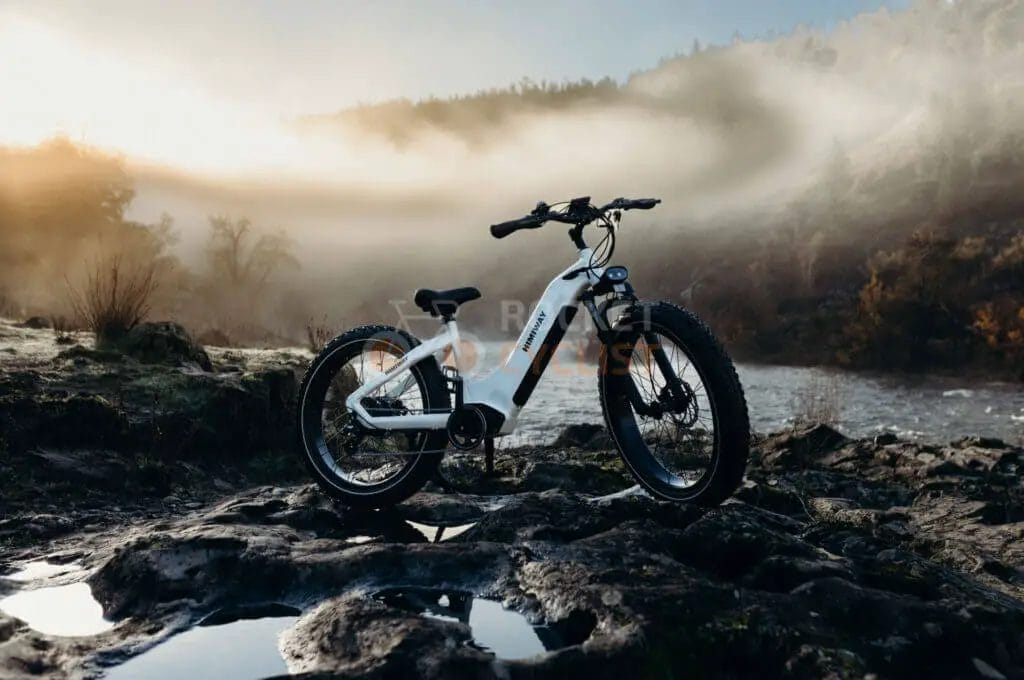Last Updated on July 7, 2023 by Vinson Lozano
In recent years, the popularity of electric mountain bikes (e-bikes) has soared. These bikes have revolutionized the outdoor adventure industry by providing an extra boost to riders, allowing them to tackle challenging terrains with ease.
One crucial factor to consider when purchasing an e-bike is its weight. Understanding how much an electric mountain bike weighs is vital to ensure optimal performance and enjoyment.

The Rise of Electric Mountain Bikes
Electric mountain bikes have gained significant traction in the cycling community due to their numerous benefits:
- Easy climbing: The electric motor assists riders when tackling steep hills, making uphill climbs far less strenuous.
- Increased range: The electric motor extends the range of the bike, allowing riders to explore longer distances without worrying about exhaustion or the need for shuttle services.
- Enhanced trail access: E-bikes provide increased accessibility to trails for riders of all fitness levels, allowing more people to enjoy the thrill of mountain biking.
- Less strain on the body: The motor assistance reduces the strain on riders’ knees and joints, making e-bikes an excellent option for those recovering from injuries or with limited physical capabilities.
Why Weight Matters for Electric Mountain Bikes
The weight of an electric mountain bike can significantly impact its performance and usability. Here are a few reasons why weight matters:
- Maneuverability: A lighter e-bike is generally easier to handle and maneuver, especially through tight corners and technical sections of the trail.
- Efficiency: Lighter bikes require less effort to pedal, making them more efficient and allowing riders to conserve energy.
- Battery life: In general, heavier e-bikes require more power from the battery to maintain the same level of performance. A lighter bike may result in extended battery life and longer riding time.
- Transportability: If you plan on transporting your e-bike frequently, a lighter weight can make it easier to load onto a car rack or carry up stairs.
Overall, understanding the weight of an electric mountain bike is crucial for finding the right balance between performance, maneuverability, and battery life. It’s essential to consider your individual preferences and riding style to determine the ideal weight for your e-bike.
Factors Affecting Electric Mountain Bike Weight
When it comes to electric mountain bikes, weight is an important factor to consider. The weight of an electric mountain bike can affect its performance, handling, and overall riding experience. Here are some factors that can affect the weight of an electric mountain bike:
Frame Material and Construction
The material used for the frame of an electric mountain bike can have a significant impact on its weight. Different materials offer different levels of durability, stiffness, and weight. Here are some common frame materials used in electric mountain bikes:
- Aluminum: Aluminum frames are lightweight and offer good strength to weight ratio. They are affordable and commonly used in entry-level electric mountain bikes.
- Carbon Fiber: Carbon fiber frames are extremely lightweight and offer excellent strength and stiffness. They are often used in high-end electric mountain bikes but come at a higher price.
- Steel: Steel frames are durable and offer a smooth ride, but they tend to be heavier compared to aluminum and carbon frames.
Battery Type and Capacity
The type and capacity of the battery used in an electric mountain bike can also affect its weight. Here are some common battery types used in electric mountain bikes:
- Lithium-ion: Lithium-ion batteries are lightweight and offer a higher energy density, allowing for longer rides. They are commonly used in electric mountain bikes.
- Lead-acid: Lead-acid batteries are heavier compared to lithium-ion batteries. They are less common in electric mountain bikes due to their weight and lower energy density.
- Solid-state: Solid-state batteries are a new technology that offers lightweight and compact designs. They are still being developed and are not widely available.
Motor Size and Power
The size and power of the motor used in an electric mountain bike can also contribute to its weight. A larger and more powerful motor will generally be heavier. However, a powerful motor can enhance the bike’s climbing ability and overall performance.
It’s important to note that the weight of an electric mountain bike can vary significantly depending on the specific model and components used. Some electric mountain bikes can weigh as little as 40 pounds, while others can weigh over 50 pounds.
Understanding the factors that affect the weight of an electric mountain bike can help you choose the right bike that fits your riding style and preferences. Whether you prioritize lightweight design for maneuverability or prefer a heavier bike for stability, there are options available to suit your needs.
Average Electric Mountain Bike Weight

If you’re considering purchasing an electric mountain bike, you may be wondering about the weight of these bikes. The weight of an electric mountain bike can vary depending on factors such as the frame material, motor size, battery capacity, and additional features. Here is a breakdown of the average weight ranges for different types of electric mountain bikes:
Weight Range for Entry-Level Electric Mountain Bikes
Entry-level electric mountain bikes typically have a weight range of around 45 to 55 pounds. These bikes are designed for beginners or riders on a budget and may have a steel or aluminum frame, smaller motor size, and lower battery capacity. While they may not be the lightest option, they are still relatively manageable for most riders.
Weight Range for Mid-Range Electric Mountain Bikes
Mid-range electric mountain bikes usually weigh between 40 to 50 pounds. These bikes are a step up from entry-level models and often feature an aluminum or carbon fiber frame, more powerful motor, and larger battery capacity. They offer a good balance of performance and weight, making them suitable for riders who want a higher level of performance without compromising too much on weight.
Weight Range for High-End Electric Mountain Bikes
High-end electric mountain bikes are typically the lightest options available and can weigh anywhere between 35 to 45 pounds. These bikes are designed for advanced riders or those who prioritize lightweight and agile performance. They often feature a carbon fiber frame, powerful motor, and high-capacity battery. While they may come at a higher price point, their lighter weight can enhance maneuverability and overall riding experience.
It’s important to note that the weight of an electric mountain bike is not the sole determining factor of its performance. Other factors such as motor power, battery capacity, suspension, and overall design also contribute to the bike’s capabilities and riding experience. It’s recommended to consider these factors in conjunction with weight when choosing an electric mountain bike that suits your riding style and needs.
Benefits of Lighter Electric Mountain Bikes
When it comes to electric mountain bikes, weight plays a crucial role in their performance and usability. Here are some benefits of having a lighter electric mountain bike:
Improved Handling and Maneuverability
1. Easy to Control: Lighter electric mountain bikes are easier to handle, especially when navigating through tight turns or technical trails. The reduced weight allows riders to maintain better control and make quick adjustments on the go. It provides a smoother and more enjoyable riding experience.
2. Agile on Climbs: Climbing steep hills can be a challenging task, but a lighter electric mountain bike makes it easier. With less weight to pull up the incline, riders can tackle climbs more efficiently and with less effort. It enables riders to conquer challenging terrains with ease.
3. Precise Cornering: Lighter electric mountain bikes offer improved cornering capabilities. The reduced weight allows riders to maneuver around corners with precision and confidence, maintaining stability and grip throughout the turn. It enhances overall control and boosts confidence on technical trails.
Easier Transportation and Storage
1. Portability: Lighter electric mountain bikes are much easier to transport. Whether you need to load it onto a car rack or carry it up a flight of stairs, a lighter bike makes the process less strenuous. It’s especially beneficial for riders who frequently travel with their bikes or have limited storage space at home.
2. Versatile Usage: The lighter weight of an electric mountain bike allows for more versatile usage. Riders can easily transition between riding on trails and commuting on paved roads without feeling burdened by excessive weight. It expands the possibilities for using the bike in different scenarios.
3. Convenient Storage: Lighter electric mountain bikes take up less space when stored. Whether you need to keep it in a garage, shed, or apartment, a lighter bike won’t occupy much valuable space. It simplifies the storage process and allows for more efficient organization.
Extended Battery Life
1. Increased Efficiency: Lighter electric mountain bikes have improved energy efficiency. The reduced weight puts less strain on the battery, allowing it to last longer on a single charge. Riders can enjoy extended rides without worrying about running out of power prematurely.
2. Enhanced Range: With a lighter electric mountain bike, you can achieve a greater range before needing to recharge. Whether you’re exploring vast trails or going on longer rides, a lighter bike provides the opportunity for more extended adventures.
3. Improved Performance: A lighter bike allows the electric motor to operate more efficiently, resulting in enhanced performance. Riders can experience quicker acceleration, smoother power delivery, and overall better electric assistance while riding.
In conclusion, choosing a lighter electric mountain bike offers several benefits, including improved handling and maneuverability, easier transportation and storage, and extended battery life. Consider the weight of the bike when making your purchase to ensure a more enjoyable riding experience.
Factors to Consider When Choosing an Electric Mountain Bike
When it comes to electric mountain bikes, weight is an important factor to consider. The weight of an electric mountain bike can affect its performance, maneuverability, and overall riding experience. Here are a few key factors to consider when choosing an electric mountain bike:
Weight vs. Performance Trade-Offs
• Power-to-Weight Ratio: A lighter electric mountain bike generally has a better power-to-weight ratio, meaning it can accelerate more quickly and climb steep hills with ease. However, lighter bikes may sacrifice some stability at higher speeds.
• Handling and Maneuverability: Lighter bikes are typically more nimble and easier to handle, making them ideal for technical descents and tight corners. On the other hand, heavier bikes may offer more stability when tackling rough terrain or riding at high speeds.
Rider Weight and Fitness Level
• Rider Weight: It’s important to consider your own weight when choosing an electric mountain bike. Heavier riders may put more strain on the bike’s components and may require a bike with a higher weight capacity.
• Fitness Level: If you’re a less experienced rider or prefer a more relaxed riding style, a lighter bike may be more suitable. However, if you’re a more experienced rider or enjoy more challenging trails, a slightly heavier bike may provide better stability and control.
Terrain and Riding Style
• Terrain: The type of terrain you plan to ride on should also be taken into consideration. If you’ll be riding on predominantly flat or smooth trails, a lighter bike may offer better efficiency. However, if you’ll be tackling rougher terrain or steep hills, a slightly heavier bike may be more suitable for better traction and stability.
• Riding Style: Your preferred riding style can also influence the weight of the bike you choose. If you enjoy more aggressive, fast-paced riding, a lighter bike may be more responsive and maneuverable. On the other hand, if you prefer a more leisurely or endurance-oriented riding style, a slightly heavier bike may provide a smoother ride.
In conclusion, the weight of an electric mountain bike is an important consideration when choosing the right bike for your needs. It’s essential to find the right balance between weight and performance based on your riding preferences, fitness level, and the type of terrain you plan to ride on.


